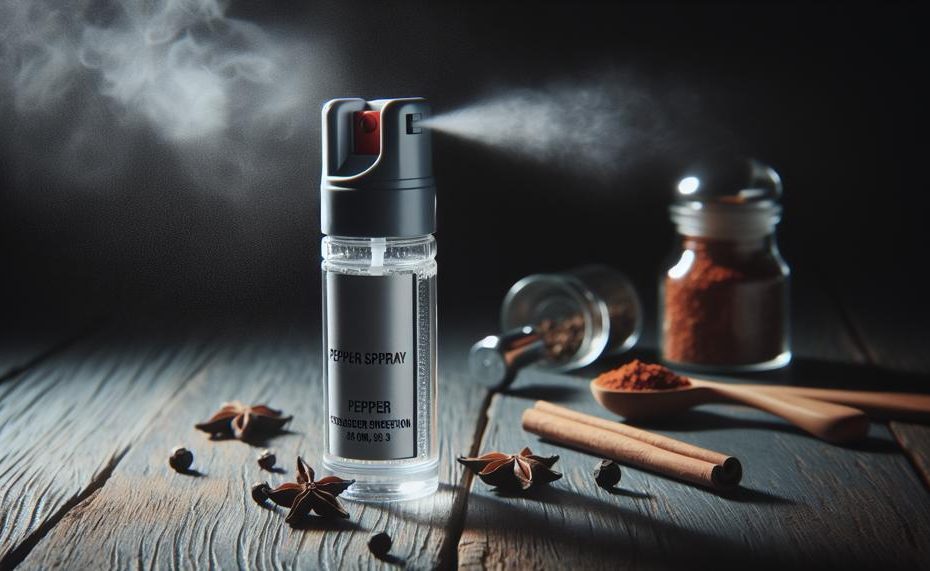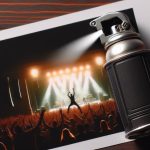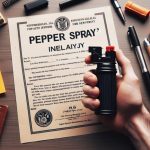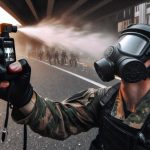Imagine walking alone down a dimly lit alley, feeling the hairs on the back of your neck stand up. Suddenly, a hand grabs your shoulder and you turn to see an attacker lunging towards you. In a panic, you reach for your trusty pepper spray and aim it at their face.
Pepper spray has become a common tool for self-defense, used by many individuals as a means of protection. Its active ingredient, capsaicin, is derived from chili peppers and when sprayed on an attacker’s face, it causes intense burning and irritation of the eyes. This reaction can incapacitate an attacker and provide enough time for the victim to escape.
But have you ever wondered about the potential effects of pepper spray on vision? In this blog post, we will delve into the science behind this popular self-defense tool and explore how it affects our eyesight. We will also discuss any potential long-term effects and important safety precautions to keep in mind when using pepper spray.
So if you’re curious about the impact of pepper spray on our eyes or simply want to be prepared in case of an emergency situation, keep reading.
Let’s uncover the truth about whether pepper spray can cause blindness.
Contents
- 1 The Basics of Pepper Spray
- 2 Immediate Effects
- 3 So, Can Pepper Spray Cause Blindness?
- 4 How Pepper Spray Affects the Eyes
- 5 Treatment and Precautions
- 6 Expert Advice
- 7 Prolonged Exposure and Complications
- 8 How to React if Sprayed with Pepper Spray?
- 9 The Ethical Considerations
- 10 Innovations in Pepper Spray Technology
- 11 Understanding the Legal Aspect
- 12 Conclusion
The Basics of Pepper Spray
Pepper spray, also known as OC spray or oleoresin capsicum spray, is a chemical compound derived from the chili plant that acts as a powerful self-defense tool. When sprayed onto an attacker’s face, it causes temporary blindness, difficulty breathing, and intense pain. This effectively incapacitates the attacker, giving the victim a chance to escape and seek help. It can also be used against aggressive animals and is legal in many places.
The active ingredient in pepper spray is capsaicin, a chemical that irritates the eyes, nose, throat, and lungs upon contact. This leads to severe burning and discomfort, making it an effective deterrent against attackers. Pepper spray typically has a range of up to 10 feet and can easily be carried for easy access in case of an emergency. However, it should not be used indoors as it can affect everyone in the vicinity.
While pepper spray may not cause permanent damage, it can be extremely painful and debilitating for the attacker. It is important to have a proper understanding of local laws and regulations when carrying pepper spray.
Additionally, taking necessary precautions such as regularly checking expiration dates and avoiding use around individuals with respiratory conditions is crucial.
As with any self-defense tool, proper training and responsible usage are key. In conclusion, pepper spray is a highly effective means of protection that should be carried by individuals who value their safety and well-being.
Immediate Effects
Pepper spray is a powerful chemical derived from chili plants that has immediate effects when it comes into contact with the eyes, nose, and mouth. These effects can last anywhere from 30 minutes to an hour, depending on the potency of the formula. Let’s take a closer look at the immediate effects of pepper spray:
- Intense burning sensation: The active ingredient in pepper spray, capsaicin, causes a strong burning sensation on the skin and mucous membranes upon contact.
- Temporary blindness: When pepper spray is sprayed directly into the eyes, it can cause temporary blindness due to inflammation of the eye’s mucous membranes.
- Difficulty breathing: Inhaling pepper spray can irritate and inflame the respiratory tract, resulting in difficulty breathing.
- Coughing and choking: The intense burning sensation and inflammation caused by pepper spray can trigger coughing and choking in the person who has been sprayed.
Duration of Immediate Effects:
As mentioned earlier, the duration of immediate effects varies depending on the formula’s potency and the person’s sensitivity. On average, these effects can last for around 30 minutes to an hour.
However, in some cases, they may persist for longer periods, especially if a larger amount of pepper spray was used.
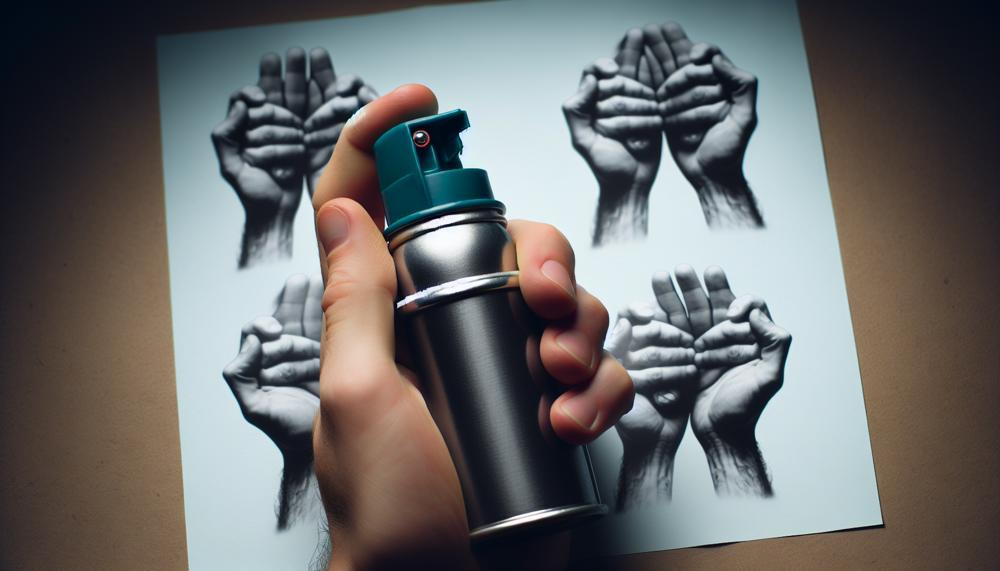
Factors Affecting Duration of Immediate Effects:
Several factors can affect how long the immediate effects of pepper spray last. These include:
- Strength of formula: Pepper spray comes in various strengths, with higher concentrations causing more intense and longer-lasting effects.
- Sensitivity of the person sprayed: Some individuals may have a higher sensitivity to pepper spray, leading to more severe symptoms that can last for extended periods.
- Amount used: The more pepper spray is used, the longer its effects will last. That’s why it’s crucial to use it responsibly and only when necessary.
So, Can Pepper Spray Cause Blindness?
Pepper spray, a chemical extracted from chili plants, can inflict severe pain and temporary blindness when sprayed on someone’s face. The immediate effects include tearing, redness, swelling, stinging, and temporary blindness.
These symptoms can be intensified in individuals with pre-existing eye conditions or diabetes. Therefore, it is crucial to take necessary precautions when using pepper spray to avoid any potential harm.
How Pepper Spray Affects the Eyes
| Immediate Symptoms | Long-Term Effects | Susceptibility |
|---|---|---|
| Tearing | Inflammation | Diabetes |
| Eyelid Closure | Burning Sensation | Eye Conditions |
| Redness | Difficulty Breathing | |
| Swelling | Coughing/Choking | |
| Stinging | ||
| Temporary Blindness |
Treatment and Precautions
To avoid any potential harm when using pepper spray, it is important to take proper precautions. These include:
- Removing contact lenses before exposure to pepper spray to prevent further irritation.
- Avoiding rubbing of eyes, instead flushing with saline solution or blinking vigorously.
- Avoiding touching the eyes or face as it can spread the oil and cause increased irritation.
- Using milk or water to relieve pain on the skin, but it will not eliminate residue from the eyes.
- Seeking medical attention if symptoms persist.
Expert Advice
According to Golden Eye Optometry, a reputable eyewear service provider, contact lenses should be disposed of if exposed to pepper spray as the oil can stick to the lenses and cause further irritation.
They also recommend seeking medical attention if symptoms persist, as well as flushing the eyes with saline solution or blinking vigorously to help remove the irritant.
Prolonged Exposure and Complications
Prolonged exposure to pepper spray can result in a variety of short-term and long-term complications. It is crucial to understand these potential effects and take proper precautions to avoid any serious risks.
Seeking appropriate medical attention is also necessary in case of any complications.
Short-Term Complications:
Respiratory Distress:
Pepper spray’s chemical compounds can cause respiratory distress, making it difficult to breathe.
This can lead to shortness of breath and even respiratory failure in severe cases. The inflammation of the airways is the main reason for this complication.
Eye Injuries:
The intense burning sensation caused by pepper spray can result in temporary blindness, blurred vision, and eye irritation.
People with pre-existing eye conditions or diabetes are at a higher risk of experiencing severe eye injuries from prolonged exposure to pepper spray.
Skin Irritation:
Direct contact with pepper spray can cause skin irritation, redness, and burning sensations. These symptoms usually subside within a few hours but may persist for longer periods in some individuals.
Allergic Reactions:
Some individuals may experience allergic reactions to pepper spray, ranging from mild itching and hives to severe anaphylaxis. It is crucial to seek immediate medical attention if any signs of an allergic reaction are observed.
Long-Term Complications:
Lingering Respiratory Issues:
In rare cases, individuals exposed to pepper spray may experience lingering respiratory issues such as asthma or bronchitis. This is more likely to occur in people with pre-existing respiratory conditions or those exposed to large amounts of the spray.
Eye Damage:
Prolonged exposure to pepper spray can cause long-term damage to the eyes, including corneal abrasions, chronic inflammation, and even permanent vision loss.
Seeking immediate medical attention after exposure is crucial in preventing such long-term complications.
How to React if Sprayed with Pepper Spray?
If you find yourself sprayed with pepper spray, it’s crucial to act fast and take appropriate measures to minimize its effects and find relief. Follow these steps:
| Step 1: Find a well-ventilated area | Pepper spray contains an irritant that can cause extreme discomfort when inhaled. Moving to a well-ventilated space can help flush out the irritant and provide some relief. |
| Step 2: Keep your eyes open and rinse with water | The burning sensation caused by pepper spray may make you want to close your eyes, but it’s important to keep them open and rinse them with clean water. This will help wash away the irritant and reduce the intensity of the burning sensation. |
| Step 3: Remove any contaminated clothing | If your clothes have been sprayed with pepper spray, remove them immediately. The spray can linger on fabric and continue to irritate your skin, so it’s best to get rid of any contaminated clothing. |
| Step 4: Avoid using oil-based substances | While it may seem like a good idea to use oil-based substances like lotion or milk to ease the burning sensation, this can actually make it worse. Oil can trap the capsaicin in your skin, prolonging the discomfort. Stick to using water or other recommended solutions. |
| Step 5: Seek medical attention if necessary | If your symptoms are severe or persist for an extended period of time, seek medical attention. Pepper spray exposure can cause temporary blindness and respiratory issues, so it’s important to get checked out by a medical professional. |
Other Tips for Treating Pepper Spray Exposure:
- Flushing the affected area with a mixture of water and liquid antacid can help neutralize the capsaicin and provide relief.
- Consuming dairy products like milk can also help reduce the burning sensation due to their casein content.
- Lemon juice, which has acidic properties, can neutralize capsaicin and act as a natural disinfectant. It may also provide some relief when applied to the affected area.
- Taking a cool shower can help rinse off the pepper spray from your body and provide some relief.
- Avoid using vinegar as it may not be effective in providing relief.
- Recovery time varies but typically lasts between 30 minutes to a few hours. During this time, it’s best to avoid touching or rubbing the affected area.
- Eye drops are not specifically designed for treating pepper spray exposure and may not provide much relief.
The Ethical Considerations
The use of pepper spray as a self-defense tool must be approached with ethical considerations in mind to ensure responsible and safe use. While it can be a valuable asset in dangerous situations, the potential consequences of using pepper spray on another individual must be carefully evaluated.
- Prioritizing avoiding harm: Before resorting to pepper spray, it is crucial to assess the level of threat and explore non-violent alternatives. Pepper spray should only be utilized as a last resort when there is a genuine danger to oneself or others.
- Responsible usage: Pepper spray should only be used for self-defense and never as a means of aggression or harm towards others. It should not be used as a form of punishment or to escalate a situation unnecessarily.
- Knowledge of laws and regulations: Familiarity with the laws and regulations surrounding the use of pepper spray in one’s area is essential. In certain locations, carrying or using pepper spray may be prohibited, and failure to comply with these laws can result in legal repercussions.
- Awareness of potential risks and side effects: While the effects of pepper spray are typically temporary, it can still cause discomfort and distress to the individual being sprayed. There is also a risk of harming innocent bystanders if used in crowded areas.
- Proper training and readiness: In case of emergencies, knowing how to properly use pepper spray is critical. Understanding how to quickly access and effectively use it while considering factors such as wind direction, distance, and potential impact on others is vital.
- Consideration for vulnerable individuals: Some individuals may have allergic reactions or pre-existing health conditions that make them more susceptible to the effects of pepper spray. Caution must be exercised when using it on these individuals.
Innovations in Pepper Spray Technology
Pepper spray technology has undergone significant advancements in recent years, with a focus on improving safety and effectiveness as a self-defense tool. From innovative foam sprays to UV marking dyes and natural ingredients, manufacturers are constantly striving to enhance the reliability of this non-lethal weapon.
Additionally, eco-friendly packaging materials have been introduced to reduce the environmental impact of pepper spray production.
One of the most notable innovations in pepper spray technology is the use of foam sprays. Unlike traditional liquid sprays, foam sprays create a thick, sticky barrier upon impact, making it more difficult for the attacker to wipe off and increasing the chances of effective defense. This foam also reduces the risk of cross-contamination, making it safer for bystanders in crowded areas.
Furthermore, pepper spray with UV marking dyes has gained popularity due to its ability to aid in identifying attackers after the fact. These dyes leave a visible mark on the assailant’s skin that can be seen under ultraviolet light, making it easier for law enforcement to identify and apprehend them.
Innovations in natural ingredients have also made pepper spray a more attractive option for those concerned about using harsh chemicals. Some companies have started using extracts from chili peppers and other natural substances in their sprays, providing a more environmentally friendly and potentially less harmful alternative.
Lastly, eco-friendly packaging materials have been introduced to reduce the environmental impact of pepper spray production. This includes biodegradable canisters and non-toxic propellants, making pepper spray a more sustainable option for self-defense.
Understanding the Legal Aspect
Pepper spray is a commonly used self-defense tool that can provide peace of mind in dangerous situations. However, it’s essential to understand the legal implications that come with carrying and using it.
While most states and countries allow the possession and use of pepper spray for self-defense purposes, there may be specific regulations and restrictions that vary by location.
- Permits: Depending on your location, you may need a permit to carry pepper spray. For instance, some states in the US require a firearm permit to legally possess pepper spray. In Canada, pepper spray is categorized as a firearm and requires a firearms license for purchase.
- Reasonable Use: It’s important to note that pepper spray should only be used when you reasonably believe you are in danger or being threatened. Using it to protect property is generally not allowed and may result in legal consequences. Make sure to use it responsibly as a last resort in physical altercations for self-defense purposes.
- Location Restrictions: Certain places, such as schools and government buildings, may have restrictions on carrying pepper spray. It’s crucial to be aware of these limitations and comply with them to avoid legal issues.
- Age Restrictions: The minimum age for purchasing and carrying pepper spray varies by state and country. In some places, minors may not be allowed to possess or use pepper spray at all. Be sure to check local laws before purchasing or using pepper spray.
- Response to Threats: The use of pepper spray in response to verbal threats may depend on the specific circumstances and laws in your area. Generally, it should only be used as a last resort in physical altercations for self-defense purposes.
- Transportation: Keep in mind that pepper spray is not allowed on airplanes. If you plan on traveling with pepper spray for self-defense purposes, make sure to check with your airline and follow their guidelines.
- Minors: As mentioned earlier, minors may have different regulations regarding the use of pepper spray. Make sure to check local laws before allowing minors to carry or use pepper spray.
- Group Threats: If you find yourself in a situation where a group of people is threatening you, using pepper spray for self-defense purposes may be necessary. However, it’s crucial to use it responsibly and only when you are in actual danger.
- Liability: As long as you use pepper spray lawfully and appropriately for self-defense purposes, you may not be held liable. However, using it recklessly or in a situation where you were not actually in danger may result in legal consequences.
Conclusion
In conclusion, pepper spray can be a powerful tool for self-defense when used responsibly. Its active component, capsaicin, induces intense burning and irritation in the eyes, making it an effective deterrent against attackers. However, it is crucial to understand the potential impact on vision and take necessary precautions when handling pepper spray.
Always stay informed about local laws and regulations regarding pepper spray, regularly check expiration dates, and avoid using it indoors or around individuals with respiratory conditions.
In case of exposure, follow proper procedures to minimize its effects and seek medical attention if needed.
